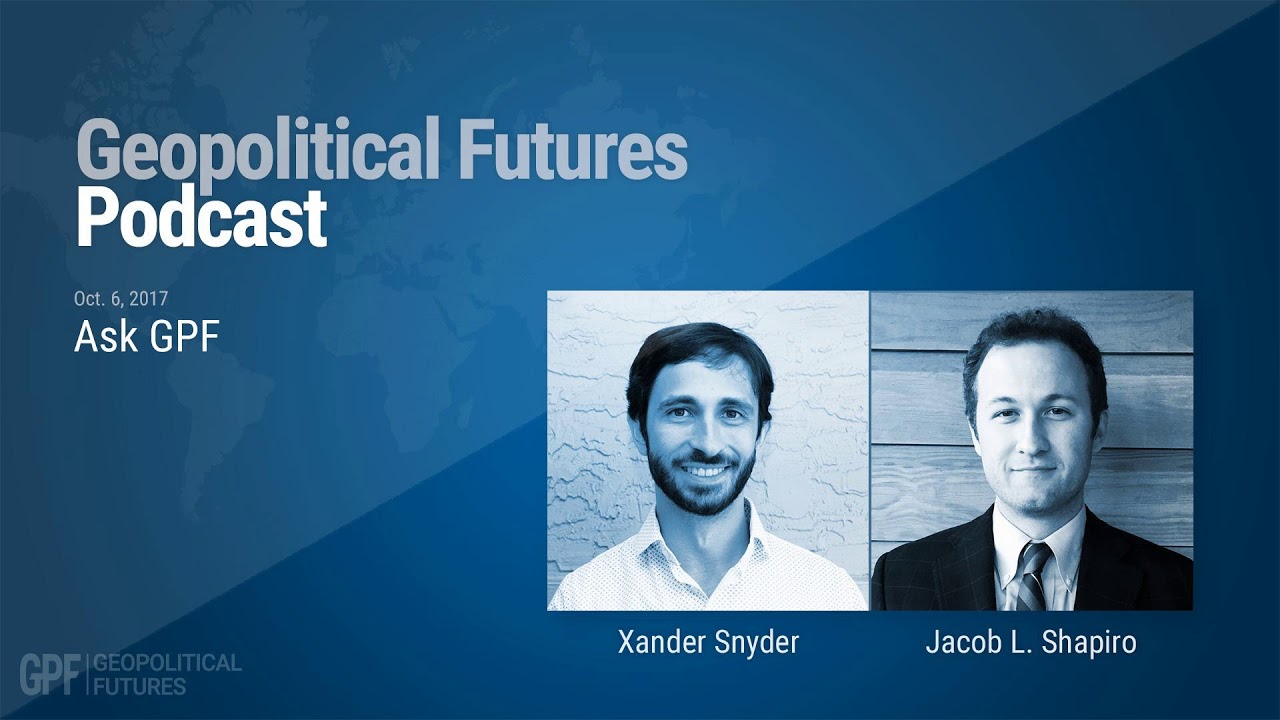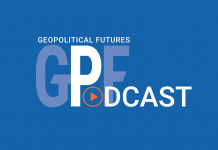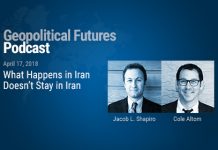Jacob L. Shapiro: Hi everyone, welcome to Geopolitical Futures podcast. I am back after a five-week hiatus and I am actually in-person this time with Xander Snyder. How’s it going Xander?
Xander Snyder: Going well. Live and in the flesh.
JLS: Yeah usually we are talking to each other over cell phone and Skype and all other kinds of marvels of modern science but now we actually get to look at each other in the same room. It’s actually kind of nice.
So today, we’re going to be doing something a little bit different. Instead of just picking a topic and sort of delving more deeply into it, we put out on Twitter this week the hashtag #askGPF and y’all have been sending in different questions that you’d like GPF analysts to answer. So we’re going to pick two or three of those questions today on the podcast today and answer them. And as always if you like this format, let us know. Send some thoughts back in to us.
So the first question, there were really two questions that came up about this. One from Andrew and one from Aaron and both were about the current state of conflict between Turkey, Iraq and the Kurdistan regional government, which recently voted for independence. They haven’t declared it obviously but they voted in a referendum that they wanted independence.
So the first question from Andrew was, do we believe that a conflict will break out between Turkey, Iraq and the Kurds? Xander, you want to take a spin at answering that first?
XS: Sure. Well what we’ve seen so far has been some sanctions that Turkey and Iraq have placed on the KRG in northern Iraq. At first it seemed like Iraq lifted those sanctions and then yesterday I read that they may actually be reimposing them.
But essentially the KRG and Turkey had developed where the KRG would sell Turkey oil and then Turkey would export that and that was one source of revenue for the KRG and Turkey basically said if you guys are going to do this whole independence thing, we’re not going to be buying oil from you anymore. And that was seen as basically a pressure point because Turkey sees Kurdish secession within Turkey as a risk to the integrity of its territory.
So there are obviously a lot of pressure points, along which conflict could break out. It seems, and without calling it a 100% that you know they’ve already been fighting each other in northern Syria. There’s already been an exchange of fire between the Turkish military and different Kurdish entities and Turkey supports proxy groups within Syria that have clashed with the Kurds. So it seems likely that especially with Turkey entering Idlib now and the western part of Syria along the Hatay province in Turkey that more conflict is possible.
Robert Shapiro: Yeah so what I would say to this and I always say this when I talk about the Kurds. The first thing you have to understand about the Kurds is that there is no such thing as “the Kurds”. The Kurds are not a monolithic group. They are somewhere between an ethnicity and a nationality and whatever other words you want to try to use to call them. They’re multiple different groups. They speak different languages, have different religions. They don’t even get along with each other that well. The Kurds and Iraq had a civil war between themselves at one point in the 90s after Saddam Hussein went after them. So that’s the first thing to understand.
So when we talk about conflict breaking out between Turkey, Iraq and the Kurds, there’s a lot of different ways that can look. Obviously, Turkey has the PKK and Turkish Kurds within its own borders that it has sort of a hot and cold conflict with which is more hot than not. The Syrian Kurds are the Turkish Kurds’ cousins basically. And Turkey obviously has a very antagonistic relationship with them.
The Iraqi Kurds is the third thing that’s sparking this question I think. And obviously, Turkey actually has a very good relationship maybe not with the Iraqi Kurds but with the Barzani clan, which really is the ruling family right now in Iraqi Kurdistan. And on the one hand, you know Turkey has a huge role to play in the economy of the KRG. On the other hand though, the KRG sees an opportunity for itself to try and gain either an increased measure of autonomy or even independence.
I think whether a conflict will breakout and obviously, there’s already a conflict on some level. But whether this is going to escalate into some kind of full-scale war, is going to be whether KRG is using this as some kind of negotiation tactic to secure more autonomy or is KRG going to go really full out for independence, make a declaration and perhaps be the start of something that Turkey doesn’t want to see happen.
Now based on what I’m seeing, it doesn’t seem to me like KRG, A: has the backers to help it fight against Turkey and Iran and Iraq all of which are against them, doesn’t have the kind of economic clout to even have an economy survive if it doesn’t have at least some allies on board. And we also haven’t seen from KRG a declaration of independence, a mobilization for war to defend itself against its territory.
So I wouldn’t preclude the chance that eventually down the line this may escalate into some kind of conflict but right now I don’t think we’re there yet. I think we’re in a negotiation phase. I think the leaders in the KRG see a strategic opportunity in the region with a lot of weaknesses all around and you see Turkey, Iraq and Iran trying to ban together to limit it as much as they can. Ultimately the Kurds position is pretty weak.
XS: Jacob, what do you make of the somewhat ambiguous threat that the Iraqi central government made before the referendum took place where I guess they said something along the lines of if there is violence in the process of this referendum, then we are not precluding the option of using military force to quell it. What does that mean?
JLS: I think that means that in a perfect world, Iraq would want to have the type of political stability to manage its entire country. The problem is that Iraq is fundamentally broken and we shouldn’t forget that even though the Islamic State is on its heels, the Iraqi Army is still going after the Islamic State in multiple places throughout the country.
So Iraq may want to send troops into the KRG to put down any kind of thoughts about secession or KRG seizing land around Kirkuk or other places that they want that land. But fundamentally, Iraq doesn’t have by itself I think the capability to just go after the Peshmerga and calm them down. I think that that’s why it’s so important that Turkey and Iran are both involved here. Iran which has a very tight relationship with the government in Baghdad. Turkey which has had an understanding with Iraq for a while that it can bomb you know PKK militants within the country.
So when you see all of these three forces arrayed against each other, I think that’s Iraq saying to the KRG look we may not be able to do this ourselves but don’t think for a second that we’re just going to sit back and let you do this. I think that’s more a threat than anything else. I don’t know that the Iraqis themselves can follow through on it. But certainly, if they can leverage relationships with Turkey and Iran and get them in the game, then KRG has to think about that a lot more seriously.
XS: So that first question was from Andrew, the next one is from Aaron Kronik also about the Kurds. The question is where do American loyalties lie with respect to the KRG? What if the KRG were to decide that a war for independence is worth it and what does that mean for Iraq basically?
JLS: Yeah this is a question that I get a lot especially when I am giving talks and being interviewed places and I think that it’s hard for Americans sometimes to understand that American loyalties don’t really lie with the Kurds at all and don’t really lie with any specific people. American national security interests in the Middle East really are not about special relationships necessarily with groups of people. Even Israel which is you know this special relationship between the United States and Israel, that was a Cold War relationship. Israel was a powerful ally after 1967 against Soviet Union’s aggressions and ambitions within the Middle East. Before 1967, the U.S. and Israel actually had something of a contentious relationship.
So America does not have any innate loyalty to the KRG and the United States actually has still not gotten off the idea that they want a unified Iraq. And the reason they want a unified Iraq is because a unified Iraq could maybe be a balance to some of the other powers that are coming up in the region. Especially Iran, especially Turkey. The problem with that is Iraq is really fundamentally broken I think.
But again though, America, the United States uses these different groups within the Middle East when it suits their interests. The United States has been arming and supporting the Syrian Democratic Forces which is basically you know the pseudonym for the Syrian Kurds, against Turkey’s wishes because that was the force on the ground that could fight ISIS and ISIS was the top priority for the United States. Once ISIS is completely defeated, I don’t think you should expect that the United States is just going to continue to support Syrian Kurds especially because it costs the United States a lot in its relationship with Turkey to do that.
So the answer to that question is you know that interests on the ground define U.S. interests. And in the Middle East, the United States is just trying to construct a balance of power and they’ll lean on and use whoever they need to in order to achieve that balance. And in the end, the balance is more important than any one group winning out. Do you see it that way Xander?
XS: I think this speaks to a bit of a larger question when it comes to geopolitical analysis generally, which is the tendency to anthropomorphize countries, right? Because if you’re good friends with someone for 10 years, you, yourself, the individual, then you tend to think of your relationship with them in terms of loyalties and what they’ve done for you in the past and you know you want to stick close with your friends and family and all that.
But that’s not exactly how nations work, you know it’s good to make analogies because that can help simplify things somewhat. But as Jacob said, when circumstances on the ground change, ultimately countries are gonna be compelled to pursue what’s in their interests and if the strategic circumstances have changed, then supporting the people that they have changed, well change. I mean you don’t need to look a whole lot further than the Soviet/Afghanistan war that lasted through most of the 80s. I mean the U.S. helped support and in a way generate the modern version of jihadism in the Middle East and then when it was no longer convenient to do that, we didn’t anymore and obviously that’s one of our greatest enemies today.
So I think when trying to analyze relationships and loyalties between nation-states, it’s good to remember that those analogies to individuals and person don’t always map 100%.
JLS: I think this actually leads really well into the third question that we wanted to address on the podcast and I think this one we will talk about a little bit longer and this one is from Paul. Paul asks are nation-states becoming outdated in a world where national interests often contradict regional interests? And he shouts out Catalonia and Scotland there but I think the Kurdish question actually also lines into that well.
And I read into this question, he’s setting up national interests and regional political interests. The way that I would start responding to this question is say that I don’t recognize the existence of regional political interests whereas I very much do recognize the existence of nation-states having interests. I don’t think that we can speak about a particular region even when you know different nation states within a region are of the same mind having a regional viewpoint.
I don’t think that for example that just because Spain, France, Italy and Portugal are sort of all right there on the Mediterranean on the Atlantic, even though that’s a regional bloc and they may have some sort of regional interests in common, I don’t think that we can speak about the region having some kind of innate interest that it’s going to be pursuing over time. It might be ban together, there might be relationships that form but ultimately each one of those nations is going to have their separate interests.
Catalonia is a really interesting foil for this question because in some sense Spain itself is not a nation state, it’s a region. It’s made up of a bunch of different autonomous communities, a bunch of different nations with a bunch of different languages just like we were talking about with the Kurds before. And the kingdom of Spain as it exists now tries to do two things, it tries to create a unified “Spanish nation” but then also recognize that the responsibility of the government of that Spanish nation is to preserve the ability to self-govern of the little smaller nations that make up Spain.
So I think there what you’re seeing in the Catalonia referendum is you’re seeing that Catalonia doesn’t feel like it is getting the autonomy that it wants from Spain. It feels also like it’s playing an outsized role in terms of the economic benefits that it offers to the rest of the autonomous communities. I think it’s something like between 20 and 25% of GDP of Spain comes from Catalonia. So there in Catalonia, you see Catalonia not even necessarily expressing national interests but wanting to talk about and wanting more autonomy, and Spain being so threatened by that, it has to push back.
So I don’t think nation-states are becoming outdated at all. If anything, I think that we are entering a period where nation-states and nationalism are only going to get more important. And I think that larger institutions that are not based on those ideas like the E.U., like the U.N. which I think is increasing weaker right now, I don’t think that those things are going to have as much power as the nation-state going forward, how do you see that Xander?
XS: Yeah I think you can use this question posed by Paul to ask another question about identity and we talk a lot about power, constraints, material resources at GPF. We also talk a lot about identity and that matters because nationalism is one form of how a society sees itself, part of a nation-state and that’s something that really became prevalent in the 17th and late 18th centuries.
But there are other ways that a society and peoples can conceive of their own identity and you know if you look at the Thirty Years’ War in Europe in the early 17th century, there is this conflict between loyalty to an area, you know the Habsburg Empire and different religions. You know, am I a Protestant or am I a part of the Holy Roman Empire? And to a degree, you see this today in the Middle East, you know am I a Shiite Muslim, am I a member of this Iraqi state that doesn’t really exist anymore? So I think to the degree that you’re gonna see conflicts between national identity and other identity, you’re going to see it more in that degree and not really circumscribed necessarily by a region.
JLS: Yeah I think that makes a great deal of sense.
XS: So those are three questions that readers and listeners sent to us this week on Twitter, #askGPF. If you like this, let us know. If you want to ask us some more questions, shoot them our way and we’ll slot them in for the podcast next week.
JLS: And other than that, we’ll see you all next week and it’s nice to be back again.
XS: Cheers.







 The Geopolitics of the American President
The Geopolitics of the American President